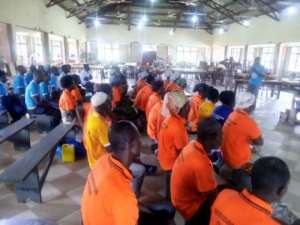
The implementation of the Mother Baby Friendly Health Facility Initiative (MBFHI) in the Upper East region, has contributed significantly to improve on maternal health and neonatal service delivery in the Bongo District.
Ms Rosemond Azure, the District Director of the Ghana Health Services (GHS) in charge of the Bongo District, made this observation in an address read on her behalf by Mr Bantiu Cabral, the Focal Person of the MBFHI and the District Nutrition Officer, during a community engagement forum organised in the District.
The Integrated Youth Needs and Welfare (INTYON), a Non-Governmental Organisation (NGO) in collaboration with the Bongo District Directorate of health service begun the implementation of the project in the area in 2016 has now scaled it up to reach 100 communities out of the 142 communities in the District.
The project employs interventions including; advocacy and focus group discussions to ensure increased demand for ante-natal and post-natal services, early initiation to breastfeeding within 30 minutes after birth, exclusive breastfeeding and promoting basic new-born care among others.
The initiative, which had funding support from UNICEF and the Bill Gates Foundation, another NGO was being implemented in Bolgatanga and Bawku Municipals as well as the Kassena-Nankana District.
The forum organised by the INTYON, was therefore aimed at getting the support of more Health Workers and Community Health Volunteers to help in the scaling up of the project to reach more of the communities in the District.
Ms Azure mentioned that the major causes of neonatal deaths such as premature births and congenital abnormalities which used to frequently occur in the area had reduced drastically with the introduction of the initiative.
'We realised that most of the new born babies die within the first day of delivery up to the first week of life, so there was the need to focus on the survival of the mother and baby between labour and immediately after birth'
She said the initiative included identifying and dealing with labour related complications, initiating early exclusive breast feeding, and giving medication geared at reducing neonatal deaths, and lauded the funding agencies for the support particularly in the areas of the provision of equipment, capacity building trainings and other logistics.
Chief Issah Ibrahim, the Executive Director of INTYON, said the project empowered the target communities to engage in community mobilisation, advocacy and sensitisation programmes targeted at traditional rulers, mothers of new born babies, pregnant women, husbands, mothers-in-law, community and religious leaders to ensure that the project succeeded.
The women groups stated that before the intervention of the project, many pregnant women used to deliver at homes and experienced either birth complications or death, and indicated that with the education they received through the focal group discussions, durbars and drama, they now give birth at health facilities with skilled nurses attending to them.
Majority of the women, who testified that children who were exclusively breastfed for six months were healthier than those who do not practised exclusive breastfeeding, said the project had helped to reduce some negative cultural practices that hindered exclusive breastfeeding, and maternal and infant health services.
GNA
By Anthony Apubeo, GNA




 "I can now see clearly with my two eyes, thanks to the generosity of Afenyo-Mark...
"I can now see clearly with my two eyes, thanks to the generosity of Afenyo-Mark...
 Election 2024: Power outages will affect NPP – Political scientist
Election 2024: Power outages will affect NPP – Political scientist
 NPP is 'a laughing stock' for luring 'poster-stickers', 'noisemaking babies' wit...
NPP is 'a laughing stock' for luring 'poster-stickers', 'noisemaking babies' wit...
 Dumsor: Matthew Opoku Prempeh must be removed over power crisis – IES
Dumsor: Matthew Opoku Prempeh must be removed over power crisis – IES
 PAC orders WA East DCE to process requests from their MP
PAC orders WA East DCE to process requests from their MP
 Defectors who ditched Alan’s Movement to rejoin NPP were financially induced – A...
Defectors who ditched Alan’s Movement to rejoin NPP were financially induced – A...
 Dumsor: Akufo-Addo has taken Ghanaians for granted, let’s organise a vigil – Yvo...
Dumsor: Akufo-Addo has taken Ghanaians for granted, let’s organise a vigil – Yvo...
 April 23: Cedi sells at GHS13.66 to $1, GHS13.07 on BoG interbank
April 23: Cedi sells at GHS13.66 to $1, GHS13.07 on BoG interbank
 GRA clarifies tax status of resident individuals earning income abroad
GRA clarifies tax status of resident individuals earning income abroad
 2024 elections: NDC to officially unveil Jane Opoku-Agyemang as running mate tom...
2024 elections: NDC to officially unveil Jane Opoku-Agyemang as running mate tom...
